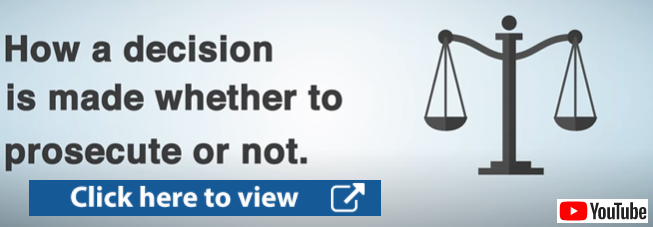In This Section
(1) Role of the Office of the Director of Public Prosecutions (DPP)
(2) Making our decision about prosecuting
(3) What happens if we decide not to prosecute?
(4) Can prosecuting decisions be reviewed?
(5) How do I request reasons or reviews?
(6) Where are prosecution cases heard?
(7) What you can expect from the Office of the Director of Public Prosecutions (DPP)
(8) What you can do if we do not meet your expectations
(9) Where to contact us
(1) Role of the Office of the Director of Public Prosecutions (DPP)
When you report a serious crime, the Gardaí will investigate it and send a file to the Office of the DPP. We will read the file to see if there is enough evidence to prosecute someone for the crime. We will also assess if it is in the public interest to bring the case to court. If it is, we will decide what the charges should be. You can read more about the Role of the DPP on our website, www.dppireland.ie.
(2) Making our decision about prosecuting
The decision to prosecute is a serious one. It can have a lasting effect on both the victim of the crime and the accused person. Only the DPP or one of our lawyers may decide whether or not to prosecute in serious cases, for example, murder, sexual offences or fatal road accidents.
The Gardaí may decide to prosecute in less serious crimes. However, the prosecution is still taken in the name of the DPP, and the DPP has the right to tell the Gardaí how to deal with the case.
The Office of the Director of Public Prosecutions acts independently when deciding whether or not to prosecute. This means that no-one, not even the Government or the Gardaí, can tell us whether or not to prosecute a case.
Video provided by the Crimes Victim Helpline
(3) What happens if we decide not to prosecute?
If we decide not to prosecute, we will give you a summary of the reasons for our decision if you ask for it.
You can ask us for a summary of reasons if you are:
- a victim of a crime (if the decision in your case was made on or after 16 November 2015);
- a family member of a victim in a fatal case (where the death took place on or after 22 October 2008).
There may be times when we cannot give a summary of reasons because of a legal issue. If this happens, we will explain this to you.
(4) Can prosecuting decisions be reviewed?
Yes. If you are a victim, or a family member of a deceased victim, and you are not satisfied with the summary of reasons for our decision not to prosecute, you can ask us to review our decision. The review will be carried out by a lawyer who was not involved in making the original decision.
(5) How do I request reasons or reviews?
All requests for reasons or reviews must be made in writing. You can find out how to do this by reading our information leaflet ‘How to Request Reasons and Reviews’ on our website, www.dppireland.ie. Requests should be sent to:
Victims Liaison Unit
Office of the Director of Public Prosecutions
Infirmary Road
Dublin 7
D07 FHN8.
(6) Where are prosecution cases heard?
The most serious cases are heard in:
- Central Criminal Court
- Circuit Criminal Court
- Special Criminal Court.
In these cases, a lawyer acting for the DPP will prosecute the case in court.
Less serious cases are heard in the District Court. In these cases, either the Gardaí or a lawyer acting for the DPP will prosecute the case.
The Gardaí will tell you if we have decided to prosecute or not. If we are going to prosecute, the Gardaí will also tell you when and where the court case will take place.
You can read more about the different courts on the Courts Service page.
(7) What you can expect from the Office of the Director of Public Prosecutions (DPP)
- take your views into account when we are deciding whether or not to prosecute
- give you a summary of reasons if we decide not to prosecute (in cases where the decision is made on or after 16 November 2015 as this is when the European Union’s Victims Directive came into force)
- review decisions not to prosecute.
- tell you the reason, if possible, why we decided not to prosecute. We will do this in cases where the death took place on or after 22 October 2008
- review decisions not to prosecute.
You can read more about requesting reasons and reviews of decisions not to prosecute on our website, www.dppireland.ie/victims-witnesses/decisions-not-to-procecute/.
- treat you with respect and in a professional, non-discriminatory and impartial manner
- take account of your personal situation, rights and dignity
- work with the Gardaí to make sure that you are kept up to date on your case
- apply to the court to ask if you can use video link or other special facilities in certain circumstances when giving your evidence
- arrange for you to talk to the prosecution solicitor and barrister before the court case begins, if you wish. They will explain what will happen in court, but they cannot talk to you about the evidence you will give.
- ask the Court of Criminal Appeal to review the sentence if we think the sentence is unduly lenient – in other words, that it is so light that it is wrong in law. We can ask for a review of sentences from the Central Criminal Court, Circuit Criminal Court and Special Criminal Court. We cannot appeal a sentence from the District Court
- appeal the decision of the judge, but only in very limited circumstances
- take your views into account when considering an appeal.
You can read more about the various types of appeals and what to expect at those appeal hearings on our website, www.dppireland.ie/victims-witnesses/appeals-information/.
(8) What you can do if we do not meet your expectations
If we do not meet your expectations and you would like to make a complaint about our service, you can contact us at the details below.
(9) Where to contact us
Address: The Director of Public Prosecutions, Infirmary Road, Dublin, D07 FHN8.
Tel: 01 858 8500
Fax: 01 642 7406
Visit our website, www.dppireland.ie for more information on:
- The Role of the DPP
- Going to Court as a Witness
- How We Make Prosecution Decisions
- How to Request Reasons and Reviews (of decisions not to prosecute)
- Making a Victim Impact Statement
- Releasing My Counselling Records
- What is a Conviction Appeal?
- What is a Sentence Appeal?
- What is an Undue Leniency Appeal?
- The Criminal Justice System

